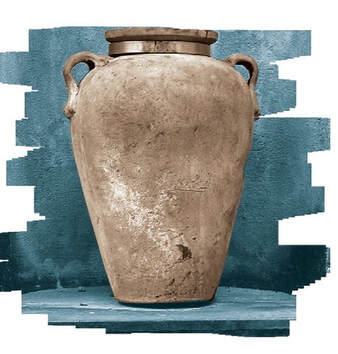|
Friends, While we remain in Pasadena under all the continued constraints of the COVID travel lockdown, we have transitioned into a full fall schedule of teaching. I (Rich) do most of my teaching in the early morning hours.
 his past Saturday, I was teaching the passage in 2 Kings 4:1-7, where Elisha is petitioned by a woman, recently widowed, whose husband was a member of the school of prophets. The prophet left debts behind, and she is desperate because people are going to take away her children to clear her husband's debts. Elisha says, "What can I do for you? What do you have in the house?" to which she at first answers, "Nothing!" but then she remembers that, well, technically she doesn't have "nothing" so she adds, "... except a jar with a little oil in it". He tells her to borrow vessels, "and not just a few" and then to go home and begin pouring the oil into all the vessels. This meant her asking, not just her two best friends, but that gruff man down the block who always yelled at her kids. She borrows vessels from people to whom she has rarely spoken. And as she continues to fill jar after jar, she sees the miraculous provision of God. It is a fun and beautiful story. I have taught this passage many times before, usually making the point that, while this is just a miracle story and hence not a direct teaching, it can also be viewed as a parable, a dramatic picture of how God often works. 1) He uses what we have. 2) He calls us to act in obedience, taking risks which require faith. 3) He often works through our community. 4) He meets our steps of faith with his unmistakable power. So, this can be a picture of how God works in evangelism. We must gather the vessels (outreach events, conversations with non-believers) and God provides the oil (interested people in whom God is already at work, soft hearts ready to receive the message, the work of the Holy Spirit in people's hearts). It is an inspiring reminder of how God works, whether to grow student fellowships or churches, or to provide for his people in need. As a parable. Certainly a fair reading of this story. But, when I was discussing this passage with about 15 church planters and evangelists in Odisha India, I wanted to make the point that this woman was not likely expecting her husband to die. Her husband was not likely an old man, nor was she an old woman, but a young woman with young children. Her husband likewise would have been young, not expecting to die. I asked the men on the Zoom call, "How many of you have young kids at home?" They almost all raised their hands. "The prophet who left behind this widow was likely about your age." They were struck by this in a new way, and soon I was hearing them share about how important it was to them that this widow was provided for by God through Elisha. These men intuitively identified with the man who had died, leaving behind a struggling widow. I must be honest and admit that I have never read this passage seeing myself in the position of the prophet who died. My widow wouldn't be without resources, our children wouldn't have been in peril. But these men are very like the prophet, living more directly by faith than I can reasonably claim to have ever done. It was no parable to them, and they didn't have to abstract the lesson of the passage in order to apply it. It was a comfort that the Lord saw them and would protect their wives and families in the case of an untimely death, especially in this COVID time. I was humbled as we carried on the discussion. These are not simple men--they also understood the parable that the story portrayed, and we discussed how it challenges us to be people who "offer up more vessels" into which God can pour out the Holy Spirit and move powerfully in people. One man, K_______, asked for prayer for the Hindu family he's reaching out to this week. As I prayed, all I could see in his video feed was his ear, pressed up to the receiver on his phone, which was near his phone camera. Like many of them, his electricity often goes out at night and he proceeds with the study by candlelight on his cell phone. He was eager to hear my prayer for him, though his English was somewhat limited. I continue to pray for Pastor K this week and am eager to get the update on Saturday. But my joy in the study was born out of a sense of what an honor and gift I receive each week, that I am able to study scripture with people who live lives very close to the context of the scripture we are studying, and from whom I can learn things I have not seen before because of that proximity. I know these men are grateful that I am spending time teaching them, and they are very motivated learners. But I count it a delight and a joy to be able to be with and pray with and for them! Please join me in prayer for the front line church planting work of these apostolic church planters in Odisha state.
0 Comments
Leave a Reply. |
Archives
April 2024
AuthorRich and Lisa Lamb Categories |
 RSS Feed
RSS Feed